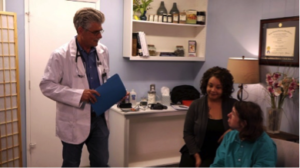#MeToo: Helping Women With Intellectual and Developmental Disabilities Talk Openly About Sexual Violence With Health Care Professionals
 Prompted by recent news events, women everywhere are speaking up and sharing accounts of sexual violence. Social media feeds have been so inundated with tales of unwanted personal sexual encounters that it has sparked an online media campaign, punctuated by #MeToo. However, women with disabilities may face greater barriers to talking about their own experiences on social media or elsewhere. That’s why, before this hashtag went viral, The Arc’s National Center on Criminal Justice and Disability® (NCCJD®) and The Board Resource Center (BRC) teamed up to highlight the alarming rate of sexual assault among women with intellectual and developmental disabilities (IDD). Just this fall these two organizations, with the assistance of a one-year grant from The WITH Foundation, unveiled the Talk About Sexual Violence webpage that includes videos and other resources dedicated to building the capacity of health care professionals to empower female patients with IDD to talk about and prevent sexual assault.
Prompted by recent news events, women everywhere are speaking up and sharing accounts of sexual violence. Social media feeds have been so inundated with tales of unwanted personal sexual encounters that it has sparked an online media campaign, punctuated by #MeToo. However, women with disabilities may face greater barriers to talking about their own experiences on social media or elsewhere. That’s why, before this hashtag went viral, The Arc’s National Center on Criminal Justice and Disability® (NCCJD®) and The Board Resource Center (BRC) teamed up to highlight the alarming rate of sexual assault among women with intellectual and developmental disabilities (IDD). Just this fall these two organizations, with the assistance of a one-year grant from The WITH Foundation, unveiled the Talk About Sexual Violence webpage that includes videos and other resources dedicated to building the capacity of health care professionals to empower female patients with IDD to talk about and prevent sexual assault.
Research shows that nationally, 1 in 5 women without disabilities are sexually assaulted. However, women with disabilities face even grimmer statistics. According to the Bureau of Justice Statistics, the rate of violent victimization (which includes rape or sexual assault) of people with disabilities is more than three times higher than the rate for people without disabilities. A related survey conducted in 2012 found that out of over 7,000 respondents, only 37.3% of people with disabilities reported any type of victimization to authorities. Many societal factors have allowed this disturbing pattern to continue, including inexperience among health care professionals in broaching the topic of victimization in ways that are accessible and culturally competent for everyone.
Recognizing that health care professionals are in frontline positions to educate their patients about sexual violence, NCCJD® and BRC created easy-to-use resources to address this issue. The materials provide straightforward guidance on how to start a simple, direct and honest conversation with female patients about an all too common experience, and include two short videos: “How to Have the Conversation” and “Kecia Meets with Her Doctor”, available in both English and Spanish. Accompanying the videos are a variety of supplemental materials, including training and communication guides.
These resources are invaluable in the fight against sexual violence of women with IDD, but the first line of defense is simply believing woman with IDD when they disclose sexual assault, and listening to their experiences. The goal of The Arc’s Talk About Sexual Violence project is to support women with IDD to be heard, believed, and supported by receiving prompt and effective medical care and healing services. Every woman deserves a safe environment to honestly admit “MeToo,” and to protect herself from sexual violence.








